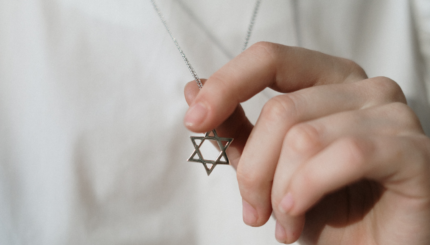On a Friday evening in March of 1999, I was called to the Torah at a synagogue in Manhattan and asked to repeat the words of Ruth from the Bible: “Wherever you go I will go, your people will be my people, and your God my God.” Then a Torah scroll was put in my arms and I recited the Shema, the prayer that declares that God is one. I cried with joy as I carried the Torah around the sanctuary so that all the congregants could kiss it.
That morning I had immersed in a mikveh, the Jewish ritual bath, and my declaration in front of the congregation concluded my conversion to Judaism.
As I left services that momentous evening, an older woman said to me, “Why would you want to convert to this?”
I didn’t know her. I didn’t know her story or anything about her experience of Judaism. I only know that while she hadn’t rejected Judaism, she also couldn’t understand why someone would affirmatively choose it. I imagine she may have experienced anti-Semitism, or had some other negative feeling related to her Judaism such that she considered being Jewish a mixed blessing — or maybe not a blessing at all.
With your help, My Jewish Learning can provide endless opportunities for learning, connection and discovery.
People often assume that most Jews by choice convert because they have a partner or spouse who is Jewish. And while it’s true that my involvement with Judaism began with a Jewish boyfriend— now my husband of 28 years and the father of our two children — as Reform Jews, I would not have had to convert to participate in Jewish life and raise Jewish children. I converted because I wanted to be a Jew — for myself, separate from my relationship with my husband.
There are a number of reasons why I was attracted to Judaism and ultimately converted.
Growing up Lutheran, my religious practice was centered in the church. Aside from reciting grace before meals, any rituals that took place at home — Christmas trees or Easter eggs, for example — were essentially secular rituals that came to be associated with Christian holidays. The religious parts of the holidays were celebrated at church.
But for Jews, so much religious ritual takes place at home, from Shabbat candles to the Hanukkah menorah to the Passover seder to the sukkah we build in the fall. I love how much home-based ritual there is.
Judaism is also a great religion for kids. Take Passover, for example. The point of our Passover celebration is to teach the story of the Israelites’ exodus from Egypt to our children. When the rabbis developed the Passover seder in the first century CE, they used food as symbols for the different parts of the story. What better way to teach people than to use food? It’s genius.
I also find Jewish traditions to be very sensible. They seem to meet people where they are on the level of basic human needs. When someone very close to you dies, you sit shiva. For seven days (though many people only observe it for three days), you stay home. You don’t go out, you don’t shower, you don’t look in the mirror. People bring you food and sit with you in your grief. It strikes me that this is exactly what a lot of people need in that situation, and our tradition developed to give it to them.
Another example: At Rosh Hashanah and Yom Kippur, we confess our sins and ask forgiveness. But Judaism doesn’t consider humans to be essentially bad or sinful—rather, it considers us to be humans, and part of being human is to make mistakes, to sometimes do things that are wrong. So you make amends and you ask for forgiveness, and you go on trying to be a decent person in the world.
Judaism also focuses on behavior more than belief (though belief also matters). We focus on doing the best we can in this world instead of looking toward a reward after we die. And we recognize that we cannot understand God or know what God is like, so there is no dictated way to be in relationship with God.
Every Jew is free to determine their own relationship with God. If that relationship is primarily intellectual rather than emotional, that’s fine. When I first got involved with Judaism, that was how I was most comfortable relating to the divine, so it gave me a way in.
Finally, Judaism values questioning and learning. Jews delve deep into our sacred texts, wrestling with them and finding meaning in them for ourselves. There are many ways to understand our texts, and different interpretations — even contradictory ones — can coexist and be valid. I love that — and it’s so amazing for me to discover new interpretations. Every time, it feels like a revelation from God.
After I converted, I became a rabbi, and now I have the opportunity to open doors for others interested in Judaism, both Jewish and not. My motivations for conversion are not the same as other converts, and that is as it should be.
Jewish tradition is incredibly rich and deep, with so much that is worth exploring. Those who come to Judaism as adults often bring a different perspective than those who were born Jewish and grew up as Jews. The experience of those who convert isn’t better or worse: it’s just different. Every Jew, whether born Jewish or Jewish by conversion, brings more richness to our tradition.
Rabbi Heidi Hoover is the spiritual leader of Beth Shalom v’Emeth Reform Temple in Brooklyn, New York.
Are you considering conversion to Judaism? Sign up here for a special email series that will guide you through everything you need to know.


